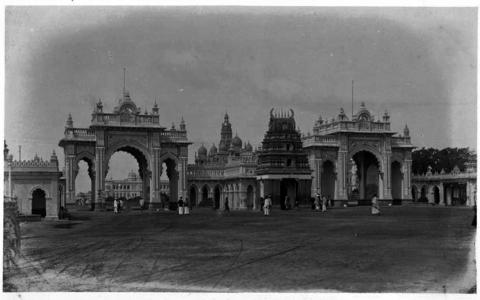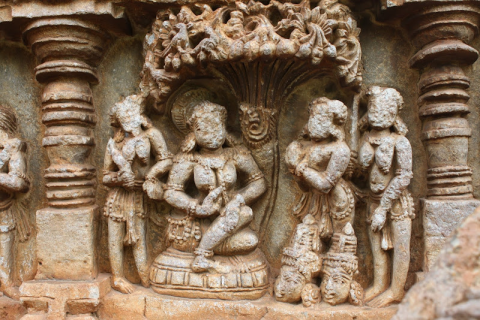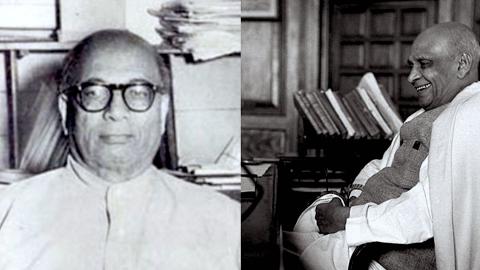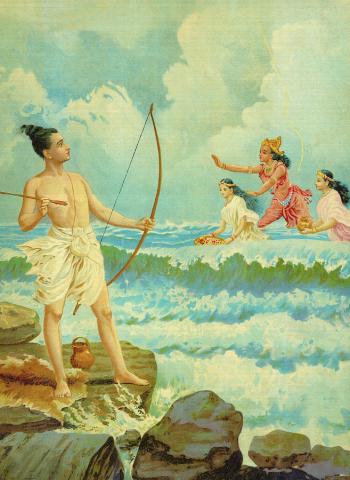December 2023

इन्द्र : क्षात्र का प्रमुख प्रतीक
वेदो में इन्द्र को पुरन्दर कहा गया हा अर्थात् शत्रुओं के पुरों का जिसने नाश किया है। यंहा ‘पुर’ शब्द, शत्रुओं के नगरों और किलों के संदर्भ में पुयुक्त है तथापि यह उनके शरीरों के संदर्भ में भी प्रयुक्त हो सकता है। तब पुरन्दर शब्द का उपयोग ‘वह जो तीनों प्रकार के शरीरों (स्थूल, सूक्ष्म तथा कारण) का नाश करनें में सक्षम हो’ के रुप में होगा। शिव को त्रिपुरारी इसी आशय से कहा जाता है। अतः पुरन्दर शब्द का अर्थ आध्यात्मिक...

In the phrase, īśvaraḥ sarvabhūtānām, īśvara is not to be taken as the same as the absolute aspect of Parabrahma. Īśvaratva is an aspect or a state of Parabrahma’s līlā. It is normally referred to as kārya-Brahma (Brahma as an effect). Supreme Brahma is without activity. When it appears to be active in the world, it is known as kārya-Brahma or īśvara. Whenever we consider either activity or the world, an element of māyā is involved. Volition,...

ಒಪ್ಪಂದಗಳೆಂಬ ಠಕ್ಕು
ಈ ರೀತಿ ಗುಲಾಮಗಿರಿಗೆ ತಳ್ಳುವುದಕ್ಕೆ ಬ್ರಿಟಿಷರು ಬಳಸಿಕೊಂಡ ಏಕೈಕ ಹಾಗೂ ಅತ್ಯಂತ ಪ್ರಬಲವಾದ ಅಸ್ತ್ರ: ಒಪ್ಪಂದಗಳು. ಒಂದೊಂದು ಒಪ್ಪಂದದ ಸಂದರ್ಭ, ಹಿನ್ನೆಲೆ ಭಿನ್ನವಾಗಿದ್ದರೂ ಅವೆಲ್ಲದರ ಅಂತಿಮ ಪರಿಣಾಮ ದಾಸ್ಯದಲ್ಲಿ ಪರ್ಯಾವಸಾನವಾಯಿತು ಎನ್ನುವುದು ನಿರ್ವಿವಾದ. ಇದರಲ್ಲಿ ಶೇಖಡಾ ೯೦ರಷ್ಟು ಒಪ್ಪಂದಗಳು ಆದದ್ದು ಯುದ್ಧದ ಸಂದರ್ಭದಲ್ಲಿ – ಅವು ಯುದ್ಧಪೂರ್ವ ಅಥವಾ ಯುದ್ಧದ ಮಧ್ಯ ಅಥವಾ ಯುದ್ಧಾನಂತರದವು.
ಒಟ್ಟಂದದಲ್ಲಿ, ಪ್ರತಿಯೊಂದು ಒಪ್ಪಂದದ ಅನಿವಾರ್ಯ ಫಲಿತಾಂಶವೆಂದರೆ – ಬ್ರಿಟಿಷ್ ನೇಮಿಸಿದ ರೆಸಿಡೆಂಟ್ ನ (Resident) ದರ್ಪದ...

The spies returned to Laṅkā and informed Rāvaṇa that Rāma and his army had camped in the vicinity of Mount Suvela. Rāvaṇa was displeased that the spies had been discovered by his enemies. One of the spies named Śārdūla explained to Rāvaṇa the power of Rāma’s prowess and the power of his army. Agitated, Rāvaṇa summoned his counsellor Vidyujjihva, the master of illusions and instructed him, “Let us delude Sītā with a deceit. Bring me an imitation...
जब कभी हम क्षात्र गुण की अनदेखी करते है तब कुछ ऐसे तथा कथित शांतिवादी लोग होते हैं जो इसे हिंसा से जोड़ कर इसे निर्दयी तथा अमानवीय समझते हैं। यह एक त्रुटियुक्त्त दृष्टिकोण है। बिना सुरक्षा ‘मात्स्यन्याय’ (अर्थात् बडी मछली छोटी मछली को खा जाती है) प्रचलन में आ जाता है। इस संबंध में महाभारत के शांतिपर्व में ‘राजधर्मप्रकरण’ पर विस्तृत विवेचना की गई है। हमें समझना होगा कि यदि व्यवस्था चाहिए तो दण्ड़ का प्रावधान आवश्यक है, दण्ड के प्रावधान से ही...

The nature of aparigraha (non-acceptance of superfluous material wealth) is well described in the story of Uṣasti in the Chāndogyopaniṣad.
Uṣasti was a brāhmaṇa living in the land of Kuru-pāñcāla. Hailstorms destroyed all the crops in the land causing a drought. People began to head out of their homes in search of food. So did Uṣasti and his wife. Uṣasti could not bear the pangs of hunger. His wife had become inured to hunger; she was emaciated...

ನ ತತ್ರ ರಾಜಾ ರಾಜೇಂದ್ರ ನ ದಂಡೋ ನ ಚ ದಂಡಿಕಾಃ ।
ಸ್ವಧರ್ಮೇಣೈವ ಧರ್ಮ೦ ಚ ತೇ ರಕ್ಷನ್ತಿ ಪರಸ್ಪರಮ್ ।। (ಮಹಾಭಾರತ, ಭೀಷ್ಮಪರ್ವ, ೧೨.೩೬)
ರಾಜೇಂದ್ರ! (ಕೃತಯುಗದಲ್ಲಿ) ರಾಜನೂ ಇಲ್ಲ, ದಂಡಿಸುವನೂ ಇಲ್ಲ, ದಂಡನೆಗೆ ಒಳಪಡುವವನೂ ಇಲ್ಲ. ಸ್ವಧರ್ಮವೇ ಪರಸ್ಪರರ ಧರ್ಮವನ್ನು ರಕ್ಷಿಸುತ್ತದೆ.
ಪೂಜ್ಯ ಡಿ. ವಿ. ಗುಂಡಪ್ಪನವರು ಮಹಾಭಾರತದ ಈ ಶ್ಲೋಕವನ್ನು ತಮ್ಮ ಅಗಾಧ ವಾಙ್ಮಯರಾಶಿಯಲ್ಲಿ ಹಲವು ಕಡೆ ಎರಡು ಮುಖ್ಯ ಅರ್ಥಗಳಲ್ಲಿ ಉದ್ಧರಿಸಿದ್ದಾರೆ. ಮೊದಲನೆಯದು ಆದರ್ಶಪ್ರಾಯವಾಗಿ. ಎರಡನೆಯದು ಎಚ್ಚರಿಕೆಯ ರೂಪದಲ್ಲಿ. ನಿರಂತರ ಜಾಗ್ರತೆಯೆಂಬ ಕಣ್ಗಾವಲೇ...

Upon listening to Hanūmān’s words, Rāma said, “Listen to my view in its entirety. I would, under no circumstance, turn away someone who has come to me seeking friendship; I would not do so even if his character was flawed. Irrespective of him being good or evil, the rākṣasa can do me no harm, can he? I can slay all evil creatures that reside on earth with the tip of my finger. I always grant protection to beings who seek refuge in me. So, bring...
